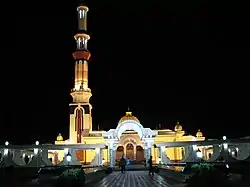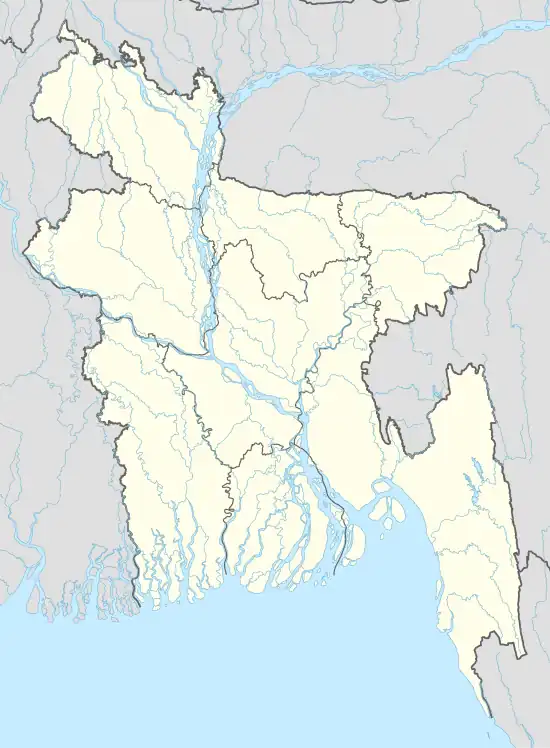Baitul Aman Mosque
The Baitul Aman Jame Masjid Complex (Bengali: বাইতুল আমান জামে মসজিদ, Arabic: بيت الأمان جامع مسجد), commonly known as Guthia Mosque (Bengali: গুঠিয়া মসজিদ) of Barisal, is a mosque complex of Bangladesh having a land area of 14 acres, comparing to the 8.30 acres land area of the national mosque Baitul Mukarram of the country.[1][2] The Baitul Aman Jame Masjid Complex consists of a mosque, a large eidgah, a graveyard, three lakes, a madrasa and an orphanage.[2] Established on December 16, 2003, Guthia Mosque is also a tourist spot in Bangladesh.[3]
| Guthia Mosque বাইতুল আমান জামে মসজিদ | |
|---|---|
 | |
| Religion | |
| Affiliation | Islam |
| Branch/tradition | Hanafi |
| Location | |
| Location | Wazirpur, Barisal |
 Shown within Bangladesh | |
| Geographic coordinates | 22.819293°N 90.250270°E |
| Architecture | |
| Type | Mosque |
| Style | Islamic |
| Date established | December 16, 2003 |
| Construction cost | 200 million BDT |
| Specifications | |
| Capacity | Approximately 20,000 |
| Dome(s) | 20 |
| Minaret(s) | 1 |
| Minaret height | 58 m (190 ft) |
| Materials | Marble Stone |
Construction
Construction of the mosque complex began on December 16, 2003, under the supervision of SAS Foundation. A small mosque already existed. [4] The complex is a private initiative by Sharifuddin Ahmed Santu, a local politician and businessman who lived abroad.[3] The mosque took four years and one month to be completed. The complex was designed by architect M. Ameenul Haque.
The cost of the construction in those times was 200 million BDT. The complex was inaugurated on October 20, 2006, with three great lakes, a mosque, an orphanage, a madrasa, an Eidgah and 58 meters high minaret constructed of white marble.[5]
Architecture
The mosque's architecture is inspired by Islamic architecture from various parts of middle east. Architect M. Ameenul Haque went on a trip to the middle east with the founder to research the architecture and design of some of the most beautiful mosques in the world. He adopted the domical style for Baitul Aman mosque.
The mosque complex stands on 14 acres. The mosque itself consists of 20 domes. The three lakes surrounding the mosque are situated so that they reflect the whole mosque from different angles. Gardens are placed around the lakes and the mosque. A number of calligraphies of Ayatul Kursi are found around the mosque and the inner part of dome of the mosque also has the Ayatul Kursi carved on it. The inner wall of the mosque has the Surat ar-Rahman written on it. The inner part of the mosque has a capacity of 1,400 people, while the outer has a capacity of 5,000 people. Several thousand people can pray in the Eidgah adjacent to the mosque at a time. The 58 meters high minaret of the mosque is the tallest in the country. A graveyard stands on the south-eastern part of the complex.[2]
Gallery
.jpg.webp) The mosque in 2016
The mosque in 2016 Guthia Mosque at dusk
Guthia Mosque at dusk Entrance to main prayer hall
Entrance to main prayer hall Baitul Aman Jame Masjid Complex, Guthia at night
Baitul Aman Jame Masjid Complex, Guthia at night
References
- দেশের সর্ববৃহত ও সর্বাধুনিক মসজিদ. Manab Zamin (in Bengali). July 28, 2014. Archived from the original on 2015-01-29. Retrieved 2015-01-30.
- অনন্য সুন্দর বরিশালের গুঠিয়া মসজিদ. Daily Naya Diganta (in Bengali). July 18, 2014. Archived from the original on 2015-01-29. Retrieved 2015-01-30.
- শিল্পের ছোঁয়ায় গুঠিয়া মসজিদ. Jaijaidin (in Bengali). July 29, 2012. Archived from the original on 2015-01-29. Retrieved 2015-01-30.
- "History". SAS Foundation. July 29, 2012. Archived from the original on 2015-01-29. Retrieved 2015-01-30.
- গুঠিয়া মসজিদ বরিশাল. Kaler Kantho (in Bengali). September 14, 2010. Archived from the original on 2015-01-29. Retrieved 2015-01-30.
_002.jpg.webp)